- Home
- Jean Stone
Once Upon a Bride Page 2
Once Upon a Bride Read online
Page 2
Throughout the years, it had been Elaine who had kept the friends together. It had been her idea to meet in New York City each year in the fall for a weekend of girl stuff. New York, after all, was the best place to shop and to eat and to go to the theater. And to laugh. Despite all their differences, they always loved to laugh.
“Third weekend in September,” Elaine announced every year, first by mail, then by phone calls, now by e-mail, though Jo suspected none of them needed a reminder.
Other than that, their meetings had been few. Lily's weddings. The birth of Sarah's son. The death of Elaine's mother. An occasional lunch or a quick “Hello” when Jo was in West Hope visiting her mother.
And now, another wedding, a second for Elaine, while Jo had not yet had a first. She'd been too busy being mature, responsible, dependable. Never a carefree kid.
Jo lay back on her bed now and stared up at the ceiling.
“Josephine!” she could almost hear her mother call. “Get a move on. Time's a-wastin'.”
Time was always “a-wastin'” according to Marion Lyons, whether it was a school day or a Saturday or time for church.
“As pretty as your mother,” Ted, the butcher, said on Thursdays when Jo stopped by to pick up hamburg and flank steak and pounded veal chops for the week while her mother was at work as the clerk at the town hall.
“Such a smart girl,” Mrs. Kingsley at the bookstore always commented with a knowing nod when Jo bought one of many books.
“A wonderful sermon,” the congregation said, one after another, each month when Jo delivered the “children's” message from the purple-draped pulpit.
How Jo had hated West Hope.
She turned onto her side now and picked at the chenille dots that covered the twin bedspread, the same bedspread that had been there since the sixties and seventies, yet, unlike her, did not seem to have aged. How many nights had she picked at these same dots, dreaming of the day she'd escape the claustrophobic town and its smothering people for a real life of her own?
She had escaped, of course. The “Most Likely to Succeed” had succeeded for a time, in the big city, Boston, where she had a fancy condominium and a to-die-for wardrobe and men, so many men, who loved her, but Jo Lyons was too busy succeeding to bother to love them back.
She had succeeded, and then she lost everything, though she hadn't yet admitted that to her mother, to her friends, or, most of all, to West Hope.
And now Jo had a choice.
The closing on her fancy condo was next week; her movers awaited word as to where her worldly possessions should be shipped; the brass nameplate had been removed from the Back Bay office door: JOSEPHINE LYONS AND ASSOCIATES, PUBLIC RELATIONS SPECIALISTS. The “associates” were gone, the office was, too.
She could stay in the city, in a crowded apartment like the one where she'd started out, in a dark office building with no windows and no clients, and now with a reputation to repair and a bruised heart to mend.
Or she could go home. She could move back to West Hope, open a new office, and capitalize on the Berkshires' tourism as she had suggested. She could help plan Elaine's wedding; she could stay a year, maybe two, until her pain had subsided, until her strength had returned.
“Josephine!” her mother called up the narrow, steep stairs. This time the voice was not a memory. It belonged to the robust woman who was just past seventy and who hardly needed Jo's help to get through her busy days and her bingo-playing nights.
2
It's a two-bedroom apartment on Shannon Drive,” Jo said aloud as she read the Sunday classifieds. She acted as if she'd made the decision to return to West Hope, which she had not. She was merely trying it out to see how it felt.
“There's plenty of room for you right here,” Marion Lyons said. They were seated at the kitchen table with hot tea and fresh strawberry muffins made with berries picked yesterday at the Peases' old farm. “Your room is exactly as you left it.”
“I'm not, though, Mother. I am twenty years older. I need my space. I have things that need space.”
“You won't need anything that's not right here.”
Jo laughed. “Mother, one-tenth of my clothes would not fit inside that old bedroom closet.”
“You won't need that many clothes. You won't be in Boston anymore.”
The words shouldn't have stung, yet they did. Jo folded the paper. Her gaze drifted out the window to three birdfeeders and an indoor/outdoor thermometer that hadn't worked in years. “If I decide to move back, I'd like to know what's available.”
“That apartment is in one of those brick buildings where secretaries live.” Her mother hissed the word “secretaries” through teeth that she often announced were her own, not plastic.
“You were a secretary, Mother.”
“And I worked hard to be sure you didn't have to live in one of those places. To be sure you'd live in a house like a respectable girl.”
Jo smiled at her mother who was in her Sunday best, as if there still were such a thing. She wondered if Ted the Butcher still thought Marion was pretty, and if, someday, Jo would have the same white hair that now gently cupped her mother's face, the same wide, full lips that had not, as yet, turned pencil-thin, the same green eyes that had not, as yet, faded with the light of too many summers and too many winters and too much of everything in between. “I am respectable, Mother. You certainly saw to that.”
“Then if you insist on your own place, why not buy one of those new condominiums out by Tanglewood? Lorna McCarthy's son and wife moved out there. He's in insurance. He does quite well, too.”
Jo set down the paper. “I told you, Mother, I don't want another big place. The condo in Boston was too much upkeep for me.” She stood up. “I think I'll get dressed and drive over to look at the apartment.”
“No church this morning?” Marion called after her.
“I'll leave that to you,” Jo replied. “Say a prayer that the secretaries' building has lots of closet space.”
There was no Jacuzzi in the master (and only) bath. There was no fireplace in the living room, no wide glass terrace that framed the skyline of the city. There was only a small balcony next to an identical one, where a neighbor sat on a white plastic chair smoking a cigarette, and a partial view of the hills that were dressed in summer green. Jo nodded at the neighbor, then went back inside.
“There's a stackable washer and dryer here,” the agent said, opening what looked like a closet door.
Jo had not thought about that. She had been sending her laundry out for so many years, it had not occurred to her that now she'd be doing her own laundry and cleaning and shopping and God-knew-what again.
“Does the apartment come with a garage?” she asked.
“There's a garage in the basement. Each resident is assigned a space.”
Jo nodded and moved back into the kitchen. It was small but sufficient, with old-fashioned oak cabinets and an enamel sink. The step down into the living room reminded Jo of the old Dick Van Dyke Show, when he'd trip over the ottoman and sprawl on the floor. But there wouldn't be much room to sprawl: no more than half of Jo's furniture would fit in the room. She supposed she could store the rest.
Biting her lower lip, she thought about the expense. She'd sold her BMW and bought a Honda; the cash that was left over would support her for a while. Until she regained her balance and rebuilt her life. Until she could breathe again.
Jo told the woman she'd have to think about the apartment. Then, with a long, deep sigh, she returned to her car, wishing she could fast-forward a year, when surely she'd have made it from point A to point B, when surely she'd know if home was Boston or West Hope, when surely she'd know what she was going to do for the rest of her life.
When surely she'd no longer flinch when she heard Brian's name.
Lily called later that afternoon.
“I thought you'd be back in Manhattan by now,” Jo said.
“No,” Lily replied. “I couldn't resist renting a car and spending the ni
ght at the Route 7.” She meant the Route 7 Motor Lodge. It was where the Winston College underclasses had partied, the underage drinkers; it was where they had dabbled with sex and with pot.
“Dear God,” Jo said. “Is that place still standing?”
“Still with the same orange shag rug on the floor. Still with the smell of stale beer.”
“Well,” Jo replied, “I'm sure it's a refreshing change from your Park Avenue penthouse.”
Lily giggled. “Oh, quite! And it helped me come up with a fabulous idea.”
“The Route 7 inspired you? Why does that frighten me?”
“Stop it, stop it! I'm serious!” She was excited, almost breathless. “At first I thought I should use some of Reginald's money as a gift to the college. You know, to do something honorable.”
Jo realized then how much she'd missed Lily, how much her friend's unjaded view of love and of life had brought unexpected fun to Jo's studious world. She couldn't resist saying, “You hated school, Lily.”
Lily filled her small lungs, then let out a sigh. “I know. I had a memory lapse, but that's over now. I have a better idea.” A flurry of static told Jo that Lily was on her cell phone. “A business,” Jo thought she heard her friend say.
“Did you say ‘a business'?”
“I sure did.”
“Have you been drinking wine again with Sarah and Elaine?”
“I mean it! I want to open a wedding-planning business. Right here in West Hope.”
More static. More short breaths.
Then, “Second weddings!” Lily cried above the noise. “Encore marriages!” She banged her phone against something. The static stopped. “Can you hear me, Jo?”
Yes, Jo could hear her.
“Think about it, Jo. First weddings are for those fanciful starter marriages. No one—no one—gets married just once anymore. But what about second-wedding etiquette? Should it be different? The gowns, the ceremonies, the gifts, and—oh, my—the relatives? Oh, Jo, don't you see? Second weddings are a market just waiting for someone like us to manage. And West Hope is perfect. You said yourself that the tourism is terrific. We could promote the Berkshires as a destination for weddings, with nearby reception venues like Tanglewood and The Mount . . .”
“Whoa, slow down!” Jo wedged in her words. “Lily,” she said, “you don't want a business. You've never even worked.”
“Don't be a poop, Josephine. This could be fun. We could get a showroom and everything. We could have lots of respect in this town. We're Winston grads, after all.”
Static interrupted again. Or perhaps it was the ghosts of other alumnae cheering Lily on.
Jo ran her fingers through her hair, which was still taupe, not yet white like her mother's. She thought about each of Lily's three whimsical weddings, when the bride had been in her center stage glory, and the groom had looked delighted, if not slightly bewildered. It was hard to imagine Lily with a head for, or an interest in, the sensibilities of business. “Lily,” Jo said, “business isn't a game. Besides, I'm not even sure if I want to come . . . back.” She purposely said “back” and not “home,” because it made West Hope seem more detached, less important. “I think it's great if we help Elaine plan her wedding, but none of us really knows what we're doing. How on earth could we open a business?”
There was a long pause. Then Lily said, “We can learn, Jo. For one thing, I've been to tons of weddings. Elegant, fabulous, outlandish weddings. Here, there, everywhere in the world. I'm sure I've picked up a tidbit or two.”
It was Jo's turn to pause. “You really are serious.”
“Completely.” She sounded so matter-of-fact, so un-Lily-like. “Since Reginald died, I've had nothing to do except talk to my attorneys and his beastly old sister. My life was Reginald's. His friends, his parties, his favorite places to travel. I want my own life now.” Then her light heart returned and she giggled in the way that only Lily giggled. “At least until I find another man.”
Another man. Apparently Lily still believed that true love conquered all.
“I'm going to talk to Sarah,” Lily continued. “She's so creative, Jo. Imagine the grand ideas she could come up with!”
“Sarah said it herself, Lily. She designs jewelry, not banquets for three hundred.”
“Oh, it's all the same. Besides, I think she won't say no to a change. Between you and me, I think her musician-boyfriend is on the road way too often and I think our Sarah gets a little lonely.”
Jo shook her head. When it came to Lily, all trials and tribulations came down to a man.
“Elaine's wedding can be our first,” Lily continued. “We can build our portfolio with the photos. And it will help us learn about vendors and service people to connect with, that sort of thing. Come on, Jo. Wouldn't it be more fun than dreary old public relations? Wouldn't if be fun to be together again?”
“Oh, Lily, I don't know . . .”
“Please, please? You're so successful, and you know all about business. As long as you're thinking of coming back to West Hope, wouldn't it be perfect? Oh, Jo, wouldn't it be grand?”
Static again crowded the line.
Jo closed her eyes and wondered if Lily's idea might just be the way from point A to point B.
3
I am a forty-two-year-old man who knows nothing more—or less—about women than any of you. I have had my share of lust and no-lust relationships, one-night stands, two-year stands, relationships that were too short, and some that were too long. Sometimes I look at my eleven-year-old daughter and realize I don't even understand her: why she now only pretends that she wants to go fishing with her dad when she used to love it. (I wonder how much longer it will be before she simply says, “No thanks.”)
And so my mission is for all of us: to root out the essence of this thing called “woman” so that we may learn, if not master, the artful games they play, and unearth our own answers as to why it is, despite our Venus/Mars, yin/yang differences, we still remain attracted, like a moth to flame, a bee to pollen, and, yes, a fly to shit.
Are we really so
self-centered,
shallow, and
manipulative,
that it's only about sex?
Andrew leaned back in the old oak chair at the antique Yankee dining-room table in his cozy cottage. He closed the lid of his new silver-blue, shiny laptop and wondered if Buzz had circulation in Australia, and if so, would Patty figure out that this column was his?
4
While Lily busied herself looking for a shop that would showcase their “business,” Jo began making the endless tangle of calls necessary before the final closing of her condo: the phone company, the electric company, cable. And the most difficult, to the elderly president of the condominium association, who had thrown her annual red-and-white Valentine's ball to which Jo and Brian had gone.
“I haven't seen you and that handsome man of yours in some time,” the woman said.
“Are you moving to New York?”
“Are you tying the knot?”
“Oh, it's so wonderful to see young people so much in love.”
Jo spent the rest of that day lying on the chenille bedspread, tears leaking from the corners of her eyes.
Two days later, when Jo was at the kitchen table trying to decipher all the small print, Lily called. “I've found a to-die-for storefront in the center of town,” she squealed. “It even has an adorable apartment upstairs for me, which will be easier than the commute! But we have to act fast, because someone else wants it.” Jo recognized a real estate agent's ploy, but was stopped from speaking up when Lily quickly added, “Oh, Jo, this is the best time I've had in years.”
“I'll meet you in half an hour,” Jo reluctantly agreed, then jotted down the Main Street address. She hung up the phone and looked at the mess of papers on the table. Her attorney had scheduled the closing. Thank God, she'd break even after paying back the first mortgage and the second and the third. She tried not to think about the money she had lost
, at how much Brian had cost her. She tried only to focus on moving forward, moving on.
Thank God her mother had been busy at the church that week, setting up for the rummage sale that always brought in big bucks from the Yuppie tourists who thought old New England stuff was somehow something to be treasured. Thank God Marion did not have to witness her daughter's fall from grace, financial and otherwise.
“It just didn't work out, Mom,” Jo had explained to Marion the first night she'd come home and the two sat at the same table where they'd shared their troubles as far back as Jo could remember, as far back as when Jo's father had run off with Doris Haines, the science teacher at the junior high, as far back as when Jo had her first date with Brian Forbes, the West Hope football star who was two years ahead of Jo in school, and, her mother warned her, was only looking for “one thing.”
He didn't get that thing that year. Not until the next year, when she was a junior and he was working at his father's antiques store and was supposedly making up his mind whether he'd “bother” with college.
“He's not as smart as you are,” her mother had warned more than once, as if that should matter. He'd been smart enough to know that Jo was madly in love with him; he'd been smart enough to know that once they'd “done it” on a Sunday night in the back room of the antiques store when everything was locked up tight and the only light was from a lamp that had come from Tiffany's that Brian covered with a thin red lace cloth—well, he'd been smart enough to know that Josephine Lyons would be his forever.
They never did get married, though.
Her mother said that people commented on the pair, saying that Jo kept Brian away from pranks and out of trouble. They said Brian never would have finished college if it weren't for Jo, that he would have killed himself on that motorcycle he rarely drove because Marion had forbidden Jo to ride on the back of it. They said that Brian was a lot like Jo's father, a good-time boy with charm and flash, but not a lot of sense.

 A Vineyard Morning
A Vineyard Morning A Vineyard Summer
A Vineyard Summer A Vineyard Crossing
A Vineyard Crossing A Vineyard Christmas
A Vineyard Christmas Beach Roses
Beach Roses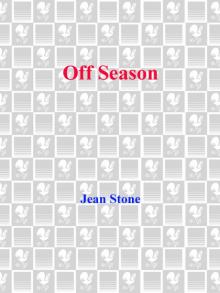 Off Season
Off Season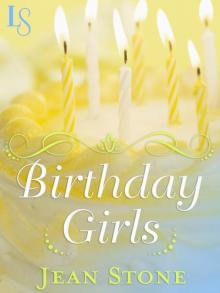 Birthday Girls
Birthday Girls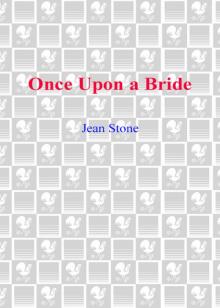 Once Upon a Bride
Once Upon a Bride Places by the Sea
Places by the Sea Trust Fund Babies
Trust Fund Babies The Summer House
The Summer House Tides of the Heart
Tides of the Heart Sins of Innocence
Sins of Innocence Four Steps to the Altar
Four Steps to the Altar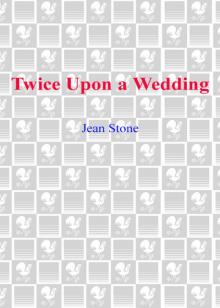 Twice Upon a Wedding
Twice Upon a Wedding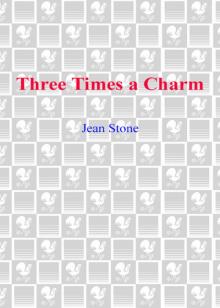 Three Times a Charm
Three Times a Charm